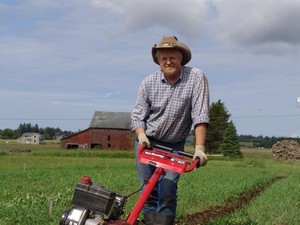10 Aug Mon 2009
Review of Jeff Rubin's Book on the End of Globalization
I just finished Jeff Rubin's Why Your world Is About to Get a Whole Lot Smaller: Oil and the End of Globalization (2009). Rubin is a Canadian economist who was one of the first to predict soaring oil prices in 2000. Rather than working in academia, his expertise comes from being head economist for CIBC World Markets for 20 years. [CIBC World Markets is the investment banking arm of the Canadian Imperial Bank of Commerce.] His book is remarkably free of jargon, but it does require close reading in some parts. Since I am gathering as much info about peak oil as I can stomach, I naturally gravitated toward his book. Rubin's main thesis is that our current recession was caused by the runup in oil prices, which was in turn caused by the increasing depletion of worldwide oil reserves and the lack of significant new discoveries to replace them. The corollary is that once our current recession dissipates and the developed-world economies start to grow again, more oil will be used and prices will rise. As prices rise to a tipping point (always a moving target), worldwide economies will then drop into another recession. This growth and bust cycle will be more volatile than in the past.
However, Why Your world Is About to Get a Whole Lot Smaller is not a gloom and doom book. Rubin sees opportunities in not being able to get as many commodities from globalized world markets. Blue-collar jobs will come back to the US and Canada, for example, once the cost of shipping commodities from China becomes prohibitively expensive. Local produce will be able to compete with grapes from Chile and people will be forced to eat more food in season. Here's an example of his reasoning:
"Peak oil may soon give us peak food. Back at your local market, there will still be food on the shelves, of course. But it is more likely to have come from nearby, and it is certain to be more expensive. When energy prices are high, the cost of the labor and the fuel to grow food, as well as the cost of shipping and retailing it, will be higher and will rise with every dollar increase in the price of a barrel of oil (p.225)."
And here is my favorite line in the whole book, "Suddenly the price you pay for those boutique blue potatoes at the farmers' market is looking like a bargain (p.226)."
One of the concepts I have been stressing for the last three years is that industrial produce and organic produce each have their own levels and industrial produce has been able to lower prices because of globalization, which is itself dependent on cheap oil. Organics have been higher for quite some time because their price level is based on more human labor than industrial agriculture. Once the price level of industrial produce rises to the level of organics, the choice to the consumer will be simple. Let's see - I can buy potatoes that have very little flavor, are mass-produced using chemical fertilizers and herbicides, and are pumped up with water to a huge size. OR I can buy local potatoes that have tremendous taste, are freshly dug, grown sustainably with a reverance for the soil and have much more nutrients per pound FOR THE SAME PRICE. Sounds like a no-brainer to me. The challenge to the organic/sustainable farmer is to not try and hold the higher relative price point. That's why, for example, I lowered my prices an average of 10.4% this year. I expect I will lower them again next year. As I get more efficient with my sustainable practices, I can afford to charge less and grow more. This is a far cry from the volume required in "Get big or get out," and is based instead on flexibility WITHIN my small-scale efficiencies. [As I have mentioned before, there are both large-scale and small-scale efficiencies.]
So, Rubin and I have arrived at the same place through different routes. To wit, globalization is finished and your world will get a lot smaller. This is not a bad thing and you and I will be better off for it.


Hi Walter:
I do appreciate your book review and I applaud your bringing academia to the blog.However, I look at things from my little local perspective as an urban farmer who is really STRUGGLING to make ends meet .I look to read more of comparative studies especially from a farmer's field experience point of view .Like how does globalization affect us farmers in US now?Not so appealing!To think globally and act (grow)locally..May be!
Good book review.Read my blog and crtique pls!
Tony(Alt.Comm.Farmer)
Tony - Thanks for both your comments. I have an academic background, but I can't get a job teaching anthropology. At least I can grow food and bring a little money into the household. Most small farmers are struggling, but I am optimistic about the future.